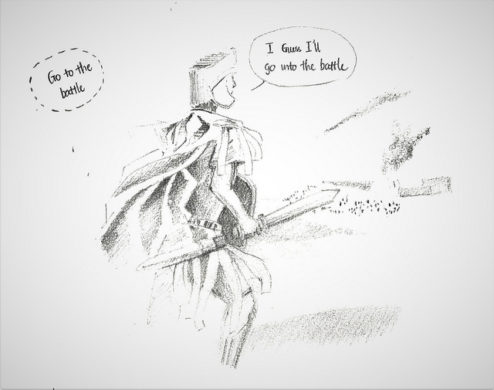
Photo illustration by Khang Do.
By Benjamin Minch, Staff Writer
When reading ancient texts such as The Iliad, you can’t help but wonder how humans behaved back during that time period. Many of the actions taken by characters in the novel are very strange and almost unrelatable to humans today. By reading these texts, it seems that ancient civilization was very different from today’s society. This is where the Bicameral Mind hypothesis comes into place.
The term first appeared in 1976, when it shook the psychology world for nearly a decade. The hypothesis, which derives from bicameralism, means there are multiple houses making decisions and states that before 3,000 years ago, all of human civilization was unconscious. They only made decisions based upon a “voice of god” in their mind.
Bicameralism, a radical idea about ancient civilization, was created by Julian Jaynes, a psychologist. According to Jaynes, consciousness requires thinking through a problem and being able to view yourself beating that problem. Jaynes believes that this ability was a learned behavior that was only recently added to human civilization as it became more advantageous to think of decisions on your own. This wave of consciousness eventually overthrew the unconscious mind because conscious people are able to deceive and lie.
Take for example, driving down a highway, a task that most people do unconsciously. If you are unconsciously driving down the highway and all of a sudden, you see a mime in the middle of the road. This mime seems to be stuck in an invisible box with no escape. In a bicameral mind, you wouldn’t think to move out of the way from the mime unless you hear a voice inside of your brain that seeming belongs to a deity that says, “don’t hit that mime!” A conscious mind would at that point, snap out of unconsciousness, process the problem and make the logical decision to avoid the mime.
The bicameral mind is obviously more dangerous because, what if the voice in your head tells you something bad? This was seemingly the case for many people living within the bicameral mind, as the voice inside of their heads told them to build civilizations on top of mountains, or in places that were terrible to sustain life during ancient times. These voices also caused people to go into battle when they would’ve obviously lost. This was a major contributor to the fall of the bicameral mind.
The main evidence for this theory is found in ancient texts such as The Iliad. In this novel, whenever a decision comes up that is pivotal to the story, a god intervenes and speaks to the character, telling him what to do. The characters in the Iliad represent none of the traits of the conscious mind that Jaynes introduces. This is also true about invoking the muse at the beginning of the story because poetry was said to be a way that the gods talked to people in ancient civilizations.
These voices, according to Julian Jaynes, are hallucinations, very similar to those received when people are on LSD or have schizophrenia. The theory is literally called bicameralism because there are two separate chambers controlling your mind. One is feeding the other with hallucinations.
Although this is a very interesting hypothesis, it is very flawed and highly unlikely to happen in this reality. The idea is so radical that it makes it very hard to believe that something as big as this could actually happen. Claiming that an entire civilization of people were completely unconscious still doesn’t explain why these hallucinations occurred. But nonetheless, it is a very interesting idea and should be taken as just that. Sometimes great ideas become something more than themselves, and sometimes they don’t, but that doesn’t change the effect it has on our minds. Ideas like this one make us ponder and research, which advances our knowledge and our overall civilization.
We have barely begun to grasp how complex the conscious mind is, much less the unconscious. There is still much more experimentation and thought that needs to be put into this hypothesis to make it more complete.





